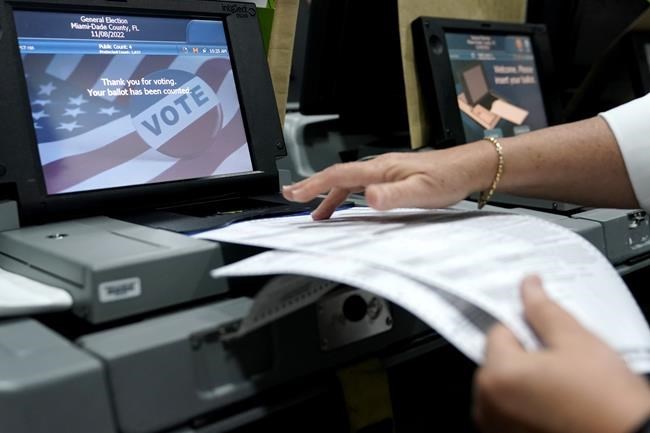FAYETTEVILLE, N.C. — When it comes to the instability, discord and fears of violence that loom over the 2022 midterms, John Szoka has a simple solution: put people ahead of politics.
It's hardly a new or revelatory idea — indeed, it's precisely the sort of sentiment one might expect from any of the dozens of early voters who filed into this North Carolina polling station on a recent Monday morning.
But Szoka, 68, isn't just on Cumberland County's voting rolls. He's also on the ballot.
"When I talk to individual voters ... what they say they want is both parties to work together for the good of the people," says Szoka, a Republican who has spent the last 10 years as a member of North Carolina's state assembly.
He points out one of his nearby lawn signs — "Deeds, not words," it reads — and touts his track record of working across the aisle with Democrats, a central feature of his campaign to become county commissioner.
These days, the idea of bipartisan co-operation seems old-fashioned in an era of "political hierarchies" where powerful individuals further up the chain of command have objectives that are different from those of the voters, he said.
"Frankly, I don't care what the political hierarchies think, because they didn't elect me," says Szoka, who's at the polling station to check in with his campaign volunteers.
"The voters here elected me, and I work for them."
That sort of political altruism is in short supply these days in the United States, where the uncertainty and apprehension about the Nov. 8 elections extends well past the questions of who wins, who loses and which party controls Congress.
In the shadow of the Jan. 6 riots on Capitol Hill last year, election season now also brings with it the prospect of intimidation, harassment and outright violence.
On Friday, an unprovoked, violent attack on House Speaker Nancy Pelosi's husband Paul at the couple's San Francisco home crystallized the dangers that the superheated election atmosphere presents to elected officials and their families.
Paul Pelosi was home alone when an intruder — reportedly hoping to confront the speaker herself — broke into the house and tried to tie up her husband. Police said the pair were struggling over a hammer before Pelosi was hit in the head several times.
In New York, a traditionally Democratic stronghold where polls suggesting surprising Republican inroads are offering a glimpse of how rough a ride President Joe Biden's party could face next week, authorities are bracing for the worst.
Police in New York City have advised officers to use "elevated vigilance" in the coming days, CNN reported Thursday, issuing a bulletin that warns of the risk of "violent extremists" motivated by racism and anger towards government.
"Given the elevated domestic violent extremism threat landscape throughout the U.S., (officers) ... are advised to maintain heightened situational awareness when deployed citywide in support of the upcoming midterm elections."
In a security notice from June that expires Nov. 30, the U.S. Department of Homeland Security warned of an elevated risk of domestic violent extremism, and a deepening threat as the midterms draw near.
"As the United States enters midterm election season this year, we assess that calls for violence by domestic violent extremists directed at democratic institutions, political candidates, party offices, election events, and election workers will likely increase."
David Schanzer, a homeland security and counterterrorism expert at Duke University in Durham, N.C., said he's not expecting anything on the scale of Jan. 6 to erupt following the midterm elections.
"I expect litigiousness in the courts, maybe protests in the case of very close elections, whether for governorship or if the control of the House or Senate hinges on a particular race," Schanzer said.
But individuals or small groups with "deep-seated grievances" are another matter, he added.
"Individuals who are inspired by the the sense of grievance that something has been stolen from them, that feel threatened by a political movement — that feel threatened by the direction the country they feel like the country is going," he said.
"A lot will rest on how our political leaders handle a close race or contested control of (Congress) — that will be critically important."
Back in North Carolina, voters are less convinced there's reason to be worried about political violence in their corner of the country — even after witnessing the violence of Jan. 6.
"I don't really think we're gonna have that again," said Bobby Jackson, a lifelong North Carolina resident, after casting his ballot.
"As far as that, I think — hopefully — America has learned that we don't need to go down that road any further."
Jackson, a former Marine, said giving Republicans control of Congress with the Democrats in the White House might lead to a lowering of the political temperature, with both sides faced with the reality of having to work together.
"A lot of people are realizing that they probably might have made some mistakes, giving one party total control over everything," Jackson said.
"When you've got one party that controls everything, basically, you're not really able to get anything realistically accomplished," he said. The president's party "shouldn't just control all of Congress."
Others, however, remain wary — especially given how much traction the so-called "election deniers" have been able to gain in the two years since Donald Trump was defeated in 2020.
"I think it's really crazy that, whether you win or lose, why could you not accept it? Why do you think just because you lost, that somebody did something wrong?" said one voter who refused to give her name, fearing for her personal safety.
As for the prospect of post-election violence, "I pray God not," she said. "I just pray not, because is it going to help anything? It's only going to make things worse."
This report by The Canadian Press was first published Oct. 30, 2022.
James McCarten, The Canadian Press



